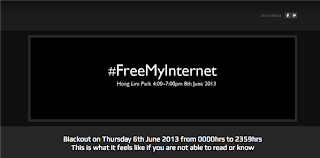
In 2013, Singapore was ranked 149th of 179 countries in the world ranking of press freedom by Reporters Without Borders. Part of bloggers unleashed since the beginning of June due to an Internet law which is now requiring information websites to get a license.
Nearly 1,500 people marched on June 7th in Singapore streets against this new law that threatens, according to them, the freedom of expression. On June 1st, Singapore has actually passed legislation that requires news sites, including a site operated by the american Yahoo! Group – to register with the authorities.
Then on June 5th, more than 130 bloggers from Singapore had symbolically closed their sites to protest this new licensing rules for information sites which can have a bad impact on the freedom of expression. The protesters had replaced their home pages with a black screen with the words “# FreeMyInternet”
MDA, the supervisory authority of the media in Singapore and the government have denied the draconian nature of the new Internet law. They state that blogs were just not considered as news websites.
An online petition in which the protesters stood against this vague and broad decision has also been implemented. The association Reporters Without Borders also condemns this new Internet law: it is likely that the Singapore government is “seeking to develop increased ability to censor sites covering local events and having an impact on a significant portion of the public opinion. ” Reporters Without Borders also fears that “the bail system associated with obtaining a license shall result in a phenomenon of self-censorship, especially for the free sites will allow low income generally only cover the costs of running the site “.
Since 2009, initiatives Internet blackout have raised, such as in France with Hadopi and in 2012 a day of protest against SOPA / PIPA projects in the United States. In Russia, similar actions against the closure of Wikipedia have not deterred the authorities to establish a blacklist of domain names and websites offering content meant to be prohibited in Russia.
To avoid censorship, choose today to access the websites of your choice, thanks to a VPN. A VPN service will make your Internet connection completely anonymous. You just have to select a VPN server in one of the available countries (France, Germany, etc …). You can access blocked websites and even more, you can protect your Internet activities with a secure VPN tunnel including a virtual military strong encryption. Le VPN installation is simple and does not take more than 2 minutes. Buy a VPN service or test our Free VPN offers by following our social media.
SUMMER SALE
First 3 years for $2.22/mo
NO LOGS
100+ LOCATIONS
P2P ALLOWED
Easy To Use
30-Day Money Back
Friendly Support
Bitcoin Accepted
Ultra High Speeds


